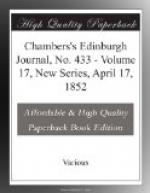When it came to fighting in earnest, and there was for the Chinese, as we know, nothing but utter defeat, still there was no report sent to court but of victory. But as million after million of taels vanished, and grandee after grandee disappeared, the emperor was obliged to be informed of the real state of affairs, and his wrath knew no bounds. In vain he threatened utter destruction to the barbarians, if they did not instantly leave the coasts; in vain called on the people to arm themselves en masse, and protect their lives and property: no one stirred, and the emperor resorted to new counsellors for new plans of defence. It was now gravely proposed, to build a fleet three times as powerful as that of the British, and station it near Singapore and Anjeer, to intercept the British vessels ere they reached China, and annihilate their fleet piecemeal. The forests were to be felled to supply materials: the only thing wanting was some English men-of-war, to serve as models. Again, Hou-chunn, the Marshal Ney of China, was ready to face the whole British fleet if he had but a steamer to carry 6000 men, half divers, half gunners; the divers would jump into the water, and sink the English ships by boring large holes in them, while the gunners would keep up an incessant fire. Striking as this plan appeared, the emperor doubted its practicability. Imitation steamships had been attempted already; but though they looked quite like the foreign ones, they would not move: the paddles had to be turned like a treadmill. Another great suggestion, was to march 300,000 men right through the Russian territories to London, and put a stop to all further operations by crushing the English at home!
Meanwhile, the British arms prevailed; and when the fleet reached the first bend in the Yang-tse-kiang, there happened a solar eclipse; it was impossible not to see that the sun of China had set for ever!
When Taou-Kwang found that the danger actually threatened his throne and his person, he hastily packed up his effects, and prepared to fly to some of the interior provinces; but being assured that peace might yet be obtained, he gave carte blanche for its conclusion. ’One can form no adequate idea,’ says Dr Gutzlaff, ’of the utter amazement of the Chinese on perceiving that the “son of heaven” was not invincible; and that he was even fallible; a revulsion of feeling took place, such as had never been known before; and the political supremacy which China had so proudly asserted, was humbled in the dust.’
As soon as peace was concluded, the first care of Taou-Kwang was to punish the champions who had clamoured for war, but proved cowards in the fight. Some had already died of grief, some had committed suicide, and others had fled. But those who remained within the monarch’s grasp, besides many civil and military officers who had been compelled to surrender their cities, were treated with merciless severity. Keshen’s extreme sentence was reversed, and he was made pipe-bearer to the emperor.




